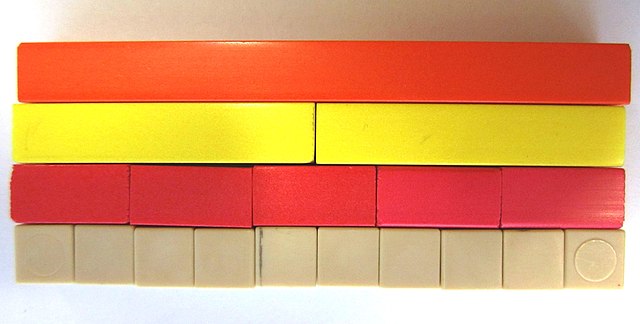Top Qs
Timeline
Chat
Perspective
Divisor
Integer that is a factor of another integer From Wikipedia, the free encyclopedia
Remove ads
Remove ads
In mathematics, a divisor of an integer also called a factor of is an integer that may be multiplied by some integer to produce [1] In this case, one also says that is a multiple of An integer is divisible or evenly divisible by another integer if is a divisor of ; this implies dividing by leaves no remainder.
This article includes a list of general references, but it lacks sufficient corresponding inline citations. (June 2015) |

Remove ads
Definition
An integer is divisible by a nonzero integer if there exists an integer such that This is written as
This may be read as that divides is a divisor of is a factor of or is a multiple of If does not divide then the notation is [2][3]
There are two conventions, distinguished by whether is permitted to be zero:
Remove ads
General
Divisors can be negative as well as positive, although often the term is restricted to positive divisors. For example, there are six divisors of 4; they are 1, 2, 4, −1, −2, and −4, but only the positive ones (1, 2, and 4) would usually be mentioned.
1 and −1 divide (are divisors of) every integer. Every integer (and its negation) is a divisor of itself. Integers divisible by 2 are called even, and integers not divisible by 2 are called odd.
1, −1, and are known as the trivial divisors of A divisor of that is not a trivial divisor is known as a non-trivial divisor (or strict divisor[6]). A nonzero integer with at least one non-trivial divisor is known as a composite number, while the units −1 and 1 and prime numbers have no non-trivial divisors.
There are divisibility rules that allow one to recognize certain divisors of a number from the number's digits.
Remove ads
Examples

- 7 is a divisor of 42 because so we can say It can also be said that 42 is divisible by 7, 42 is a multiple of 7, 7 divides 42, or 7 is a factor of 42.
- The non-trivial divisors of 6 are 2, −2, 3, −3.
- The positive divisors of 42 are 1, 2, 3, 6, 7, 14, 21, 42.
- The set of all positive divisors of 60, partially ordered by divisibility, has the Hasse diagram:

Further notions and facts
Summarize
Perspective
There are some elementary rules:
- If and then that is, divisibility is a transitive relation.
- If and then or (That is, and are associates.)
- If and then holds, as does [a] However, if and then does not always hold (for example, and but 5 does not divide 6).
- for nonzero . This follows immediately from writing .
If and then [b] This is called Euclid's lemma.
If is a prime number and then or
A positive divisor of that is different from is called a proper divisor or an aliquot part of (for example, the proper divisors of 6 are 1, 2, and 3). A number that does not evenly divide but leaves a remainder is sometimes called an aliquant part of
An integer whose only proper divisor is 1 is called a prime number. Equivalently, a prime number is a positive integer that has exactly two positive factors: 1 and itself.
Any positive divisor of is a product of prime divisors of raised to some power. This is a consequence of the fundamental theorem of arithmetic.
A number is said to be perfect if it equals the sum of its proper divisors, deficient if the sum of its proper divisors is less than and abundant if this sum exceeds
The total number of positive divisors of is a multiplicative function meaning that when two numbers and are relatively prime, then For instance, ; the eight divisors of 42 are 1, 2, 3, 6, 7, 14, 21 and 42. However, the number of positive divisors is not a totally multiplicative function: if the two numbers and share a common divisor, then it might not be true that The sum of the positive divisors of is another multiplicative function (for example, ). Both of these functions are examples of divisor functions.
If the prime factorization of is given by
then the number of positive divisors of is
and each of the divisors has the form
where for each
For every natural
Also,[7]
where is Euler–Mascheroni constant. One interpretation of this result is that a randomly chosen positive integer n has an average number of divisors of about However, this is a result from the contributions of numbers with "abnormally many" divisors.
Remove ads
In abstract algebra
Ring theory
Division lattice
In definitions that allow the divisor to be 0, the relation of divisibility turns the set of non-negative integers into a partially ordered set that is a complete distributive lattice. The largest element of this lattice is 0 and the smallest is 1. The meet operation ∧ is given by the greatest common divisor and the join operation ∨ by the least common multiple. This lattice is isomorphic to the dual of the lattice of subgroups of the infinite cyclic group Z.
Remove ads
See also
- Arithmetic functions
- Euclidean algorithm
- Fraction (mathematics)
- Integer factorization
- Table of divisors – A table of prime and non-prime divisors for 1–1000
- Table of prime factors – A table of prime factors for 1–1000
- Unitary divisor
Notes
- refers to the greatest common divisor.
Remove ads
Citations
References
Wikiwand - on
Seamless Wikipedia browsing. On steroids.
Remove ads































































